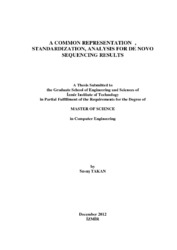Please use this identifier to cite or link to this item:
https://hdl.handle.net/11147/3556Full metadata record
| DC Field | Value | Language |
|---|---|---|
| dc.contributor.advisor | Aytaç, İsmail Sıtkı | en |
| dc.contributor.author | Takan, Savaş | - |
| dc.date.accessioned | 2014-07-22T13:51:48Z | - |
| dc.date.available | 2014-07-22T13:51:48Z | - |
| dc.date.issued | 2012-12 | en |
| dc.identifier.uri | http://hdl.handle.net/11147/3556 | - |
| dc.description | Thesis (Master)--Izmir Institute of Technology, Computer Engineering, Izmir, 2012 | en |
| dc.description | Includes bibliographical references (leaves: 48-50) | en |
| dc.description | Text in English; Abstract: Turkish and English | en |
| dc.description | xi, 50 leaves | en |
| dc.description | Full text release delayed at author's request until 2016.01.29 | en |
| dc.description.abstract | Proteomics is the study of the proteins that can be derived from a genome. For the identification and sequencing of proteins mass spectrometry has become the tool of choice. Within mass spectrometry-based proteomics proteins can be identified or sequenced by either database search or de novo sequencing. Both methods have certain advantages and drawbacks but in the long run we envision de novo sequencing to become the predominant tool. Currently, there is no a general solution to store and share de novo sequencing results which diminishes the usefulness of these results. Hence, they need to be integrated and further analyzed and cannot be used directly as evidence for peptide identification and protein sequencing at present. In order to make improvements the field of de novo sequencing a standard is vitally important. In an attempt to overcome the standardization problem, the de novo markup language (DNML) and De Novo MS Ontology (DNMSO) are developed. These standards provide many-to-many relationships between spectra and predictions, exchange and merging functions, showing all results, PTMs, compact, no using proprietary formats. Next, a programming interface is developed since it is thought that the missing of proper APIs as another obstacle, introducing a needlessly high learning curve for developers. It is standard, compact, modular, easily extensible and also have read, write, create, convert, supports current standards facilities. In order to allow the experimental proteomics community to analyze data stored in the DNMSO standard, Graphical User Interface is developed , DNMSO Analyzer, to provide some facilities such as reading of various spectra file formats, reading, viewing, summarizing of DNMSO, and several conversions from existing de novo results to DNMSO in DNMSO Analyzer. | en |
| dc.language.iso | en | en_US |
| dc.publisher | Izmir Institute of Technology | en |
| dc.rights | info:eu-repo/semantics/openAccess | en_US |
| dc.subject.lcsh | Sequential processing (Computer science) | en |
| dc.subject.lcsh | Proteomics--Data processing | en |
| dc.subject.lcsh | Proteomics--Statistical methods | en |
| dc.subject.lcsh | Mass spectrometry--Data processing | en |
| dc.title | A common representation, standardization, analysis for de novo sequencing results | en_US |
| dc.type | Master Thesis | en_US |
| dc.institutionauthor | Takan, Savaş | - |
| dc.department | Thesis (Master)--İzmir Institute of Technology, Computer Engineering | en_US |
| dc.relation.publicationcategory | Tez | en_US |
| item.grantfulltext | open | - |
| item.openairecristype | http://purl.org/coar/resource_type/c_18cf | - |
| item.cerifentitytype | Publications | - |
| item.openairetype | Master Thesis | - |
| item.languageiso639-1 | en | - |
| item.fulltext | With Fulltext | - |
| crisitem.author.dept | 03.04. Department of Computer Engineering | - |
| Appears in Collections: | Master Degree / Yüksek Lisans Tezleri | |
Files in This Item:
| File | Description | Size | Format | |
|---|---|---|---|---|
| 458313.pdf | MasterThesis | 1.19 MB | Adobe PDF |  View/Open |
CORE Recommender
Page view(s)
70
checked on Apr 22, 2024
Download(s)
38
checked on Apr 22, 2024
Google ScholarTM
Check
Items in GCRIS Repository are protected by copyright, with all rights reserved, unless otherwise indicated.